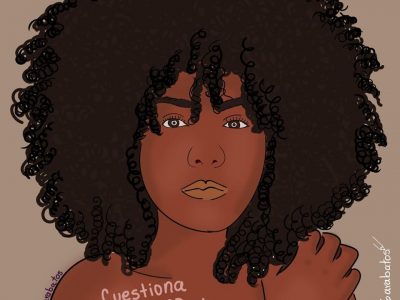
Girl in front of her school in the middle of the jungle in Costa Rica. Photo by Diego David García. Published under Creative Commons license.
In part one, Shirley Campbell explains how her Afro-Caribbean parents decided not to speak to her and her siblings in English, perhaps as an attempt to give them one less reason to be different in Spanish-speaking Costa Rica.
In part two, she explores how language and identity intertwine — and can sometimes seem at odds with one another.This post was originally published on the site Afroféminas. It has been republished on Global Voices in two parts with permission.
It is through language that we incorporate ourselves into the world and learn from songs and stories and myths and religions. Language allows us to delve into the history and spirituality of our people and teaches us to feel and to live in a certain way. Language isn't just the way we enter someone else’s world, but it immerses us into our own worlds by helping us get to know ourselves and recognizing ourselves as part of something.
On the other hand, language is also a powerful instrument for domination and discrimination and is an effective tool for transmitting and imposing values. People of African descent like me have been victims of this from all sides. At the same time, in every language and every territory, Afro-descendants have resisted in various ways in order to preserve part of their hard-won legacy that they were barely able to treasure in the process.
In the case of my mother and father, they grew up and learned from their position in the world through the English language, and later, out of necessity, they were forced to leave part of that legacy to their children, but in another language.
This story is not unique to my family; on the contrary, it is a story that repeats itself in the lives of people of African descent. It has been necessary for us to reinvent ourselves time and time again – a story that is repeated over and over in different languages. There have been centuries of forced migrations where we have had to resign ourselves to living in other language environments and in other countries in adverse conditions.
My parents and my community taught me everything I know in different languages and in various accents. What I didn’t know, I’ve had to gather along the way by collecting bits and pieces of stories and songs and lore, and thus, try to establish associations, create links, and find similarities with others’ lives – transporting myself to other scenarios and continents to build my identity.
With all of that inherited and reconstructed identity, my extended family and my community instilled in me, in various languages and accents, this urge for irreverence and activism that no language can take away from me.
I understand, however, that this reality does bring with it the implicit fact that this language was brutally imposed on us and we were deprived of speaking our own languages. We were abused for using our names and singing our songs. I understand that my ancestors were cruelly isolated in order to prevent contact between members of the same tribes and, consequently, prevent communication and insubordination. However, and more importantly, they attempted to slowly kill the soul and passion of these ancient peoples. Consequently we began to forget our most sacred forms of communication, affection, and spirituality. As a result, we had to invent and reinvent ourselves again, through brutal, but creative ways in order to survive.
I understand that before my mother other languages were spoken and that communication took place in other accents with which they prayed, fought, sang and played games that they had brought with them from some place in Africa, from which they were taken and to which my research has not yet brought me.
‘Never again will a story be told as though it were the only one’
This story does not only have to do with me; it concerns millions and millions of people and families and communities and entire peoples around the world. Communities that have been forced to grow up under different languages, and in each one create, recreate, invent, write, rewrite and reimagine a wealth of history and lore and songs in order to strengthen ourselves and once again exist. Along the way, we have had to reestablish the links to our ancestry and build new bridges that connect us with the spirituality and wisdom necessary for our survival.
Even today we continue to be subjugated and marginalized. In spite of this, we continue to triumph by being the heirs that we are of extraordinary people who are still rising up and strengthening their spirit and continue to leave their mark on the land.
My mother, my father, and my community managed – using a new language – to give us the tools necessary for resistance, ancestry, spirituality, as well as the culture that they were personally rescuing along the way. That same culture that their ancestors were slowly recovering and rebuilding with great effort and a tireless desire not to die during the journey.
As long as I can remember, I’ve communicated in Spanish
In spite of myself, Spanish is the language that I profess today. And despite speaking other languages, Spanish seduces and transports me; it is a tool that helps me break free. It frees me because it allows me to feel the way I feel and lets me write with the passion with which I write.
It is this language that gives me poetry. And although I understand its sins, I can no longer deny it, because with it I can challenge those who are trying to destroy us, those who use hate-speech to oppose our struggles. With this language, I have been able share the sweetest conversations with women just like me, with the same skin color who needed words just like theirs to feel confident and beautiful.
This language has given me magic and a voice. What once angered me today enables me to have contact with others. With Spanish, I convey love for my children and I’m filled with passion for myself and for my people. I speak it, I write it, I proclaim it, I declare it, I scream it, and I sing it. And through it, I try to impart wisdom, culture, spirituality, and most importantly, I cry out for justice for my people.
Today, this language gives me that pleasure.
It was my destiny to speak this language and it is what gives me a voice. It is however only one language, because other peoples from the diaspora are speaking and expressing and singing in many other languages, and like me, enjoy it today because it is their voice. I reinvent my Spanish daily, and by using it to my advantage, I try to shine a light based on my story of vindications and victories. I construct and deconstruct it every day and use it as an instrument of affirmation and not of oppression and racism against my people.







1 comment